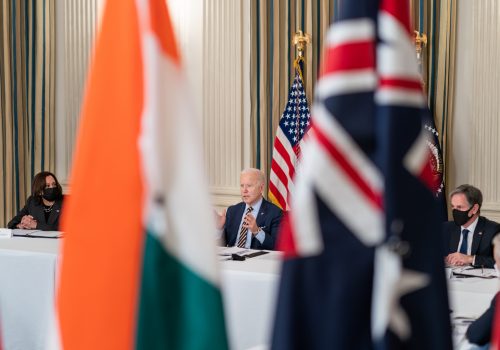FAST THINKING: Can Australian nuclear subs help corner China?
JUST IN
It’s full steam ahead to the South China Sea. The United States, United Kingdom, and Australia announced a new defense partnership Wednesday to provide Australia with advanced submarines powered by nuclear energy—a clear effort to constrain China militarily in the Pacific. What impact will this deal have on competition with China? What about the allies left high and dry? Our experts emerged from the deep with the answers.
TODAY’S EXPERT REACTION COURTESY OF
- Barry Pavel (@BarryPavel): Director of the Scowcroft Center for Strategy and Security and former top US Defense Department and National Security Council official
- Peter J. Dean (@PJD_DefStudies): Nonresident senior fellow in Scowcroft’s Forward Defense practice and director of the Defence and Security Institute at the University of Western Australia
- Benjamin Haddad (@benjaminhaddad): Director of the Europe Center
- Matthew Kroenig (@MatthewKroenig): Deputy director of the Scowcroft Center and former senior US Defense Department and intelligence official
An AUKUS among us
- The three nations involved in the deal, known as AUKUS, have been tight military allies for more than a century, but the significance of this pact is its geographic reach from the United States to Europe to the Indo-Pacific, Barry tells us. And by collaborating on nuclear-powered submarines, the three partners are linking arms “around one of the most sensitive combat systems in modern inventories,” he adds.
- While Australia’s robust conventional submarine program could use a nuclear boost, this kind of technology “had only been spoken about by the Australian strategic community in dark corners,” Peter reveals. This was due in part to political, cost, and logistical worries, but mostly “the United States’ unwillingness to share the crown jewels of its nuclear technology,” he adds. “With that barrier now smashed, the other concerns fall away.”
- Beijing will take note, Barry says: “This signals to China that European allies take China’s ongoing coercive military operations in the western Pacific (for example, against Taiwan and in the South China Sea) as seriously as do America’s Indo-Pacific allies.”
French, fried
- But European allies aren’t all on the same page as far as this deal is concerned. Ben notes that the announcement “will create a shock in Paris,” given how Australia backed out of a 2017 submarine deal with France to join with the United Kingdom and United States.
- With France taking a leading role among European nations in the Indo-Pacific, “this move will create a blow to transatlantic strategy in the region and create a lasting hurdle in US-France relations,” Ben tells us. “While motivations in the US may have been primarily commercial, this [aborted Australian submarine] contract was seen in Paris as part of a larger strategic effort in the region and will undoubtedly embolden those in Paris who have expressed doubts over the relationship with the United States.”
- Barry points out that former US President Dwight D. Eisenhower sharing nuclear technology with the United Kingdom—the closest historical analogue to Wednesday’s announcement—“caused French President Charles de Gaulle to decry the ‘Anglo-Saxon’ nuclear cooperation and propelled France to develop its own nuclear capabilities.”
- Given the broad China challenge, Barry says “it would be wise for the Biden administration to follow up this set of steps by developing analogous cooperative efforts with France, Japan, South Korea, and other leading allies.”
The sub text
- Matt argues that “to deter Chinese military aggression, Washington and its allies need the ability to sink the Chinese navy in 72 hours.” The subs Australia will build are “tailor-made for destroying enemy warships,” Matt adds. “These are exactly the capabilities we need in the Indo-Pacific to shore up deterrence and defense against China.”
- The deal also means US submarines will be able to tap into Australian support infrastructure when they’re in the area, and it will deepen cooperation among the three nations on “key technologies that will be of highest importance for future military effectiveness, including artificial intelligence, cyber, and long-range precision strike capabilities,” Barry notes.
- Peter says Wednesday’s news conference among the three leaders, which took less than twelve minutes to shake the world, “does leave us with more questions than answers.” For example, “is there any quid-pro-quo in the offing from Australia for US or UK global force posture? Where to next for AUKUS, and how will this new trilateral relationship develop?” The answers, he adds, will start to emerge at US-Australia ministerial meetings on Thursday.
Further reading
Mon, Aug 30, 2021
Why the tragic Afghanistan withdrawal should reassure US allies in Asia
New Atlanticist By Peter J. Dean
US allies in Asia should welcome the steadfastness of Biden’s decision, as Asia has been waiting far too long for the United States to reprioritize its global commitments.
Fri, Jul 16, 2021
FAST THINKING: Biden’s China policy is coming into focus
Fast Thinking By
What do this week's moves on Xinjiang and Hong Kong signal about the Biden administration’s emerging China policy? Our experts on economic statecraft connect the dots.
Mon, May 17, 2021
How to leverage the Quad to counter China’s Digital Sinosphere
New Atlanticist By Mark Linscott, Anand Raghuraman
China’s growing ambition to recode the rules of cyberspace should serve as a wake-up call for the Indo-Pacific’s leading digital democracies to cooperate.
Image: US President Joe Biden smiles while delivering remarks on a National Security Initiative virtually with Australian Prime Minister Scott Morrison and British Prime Minister Boris Johnson (not pictured) inside the East Room at the White House in Washington on September 15, 2021. Photo by Tom Brenner/Reuters.


